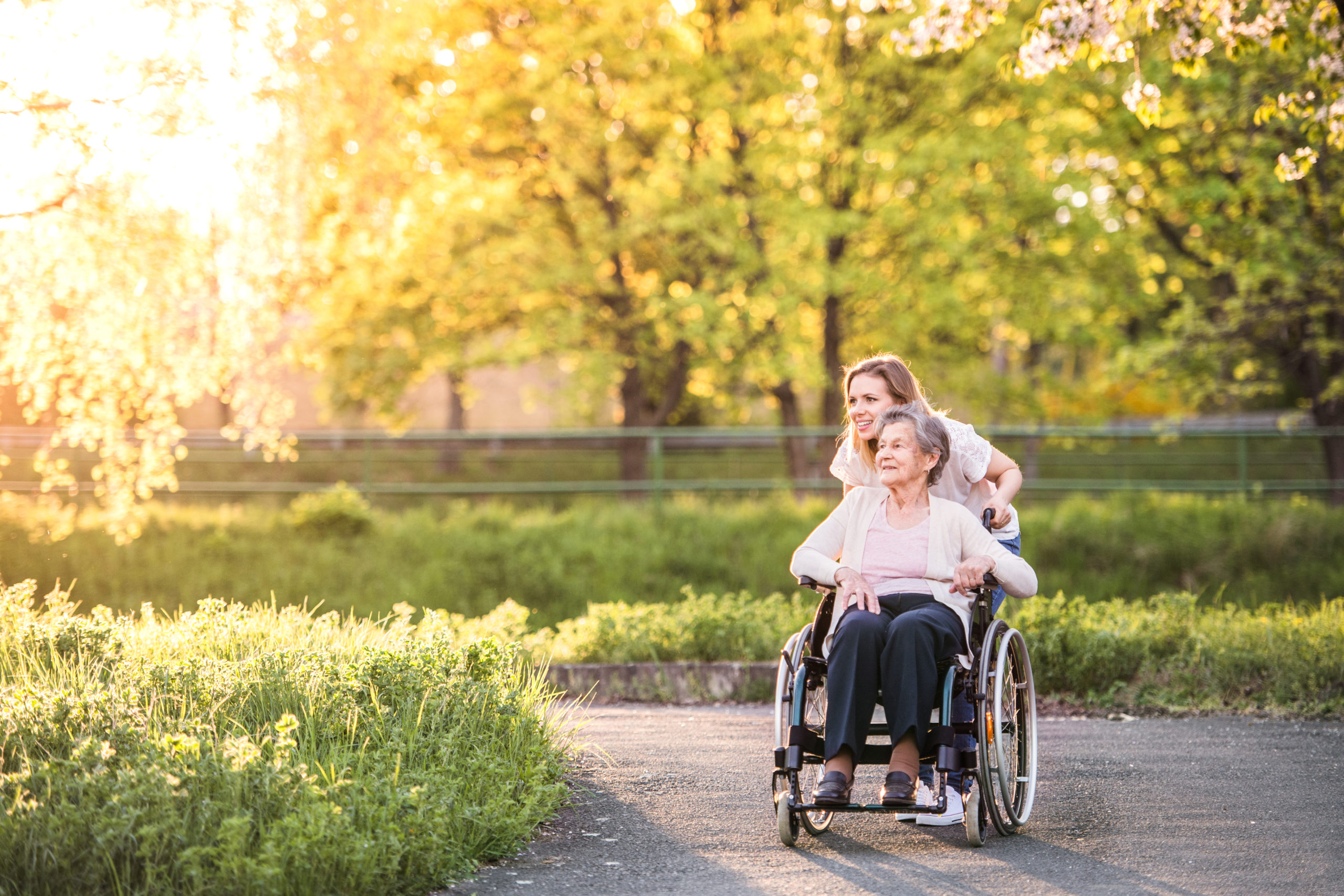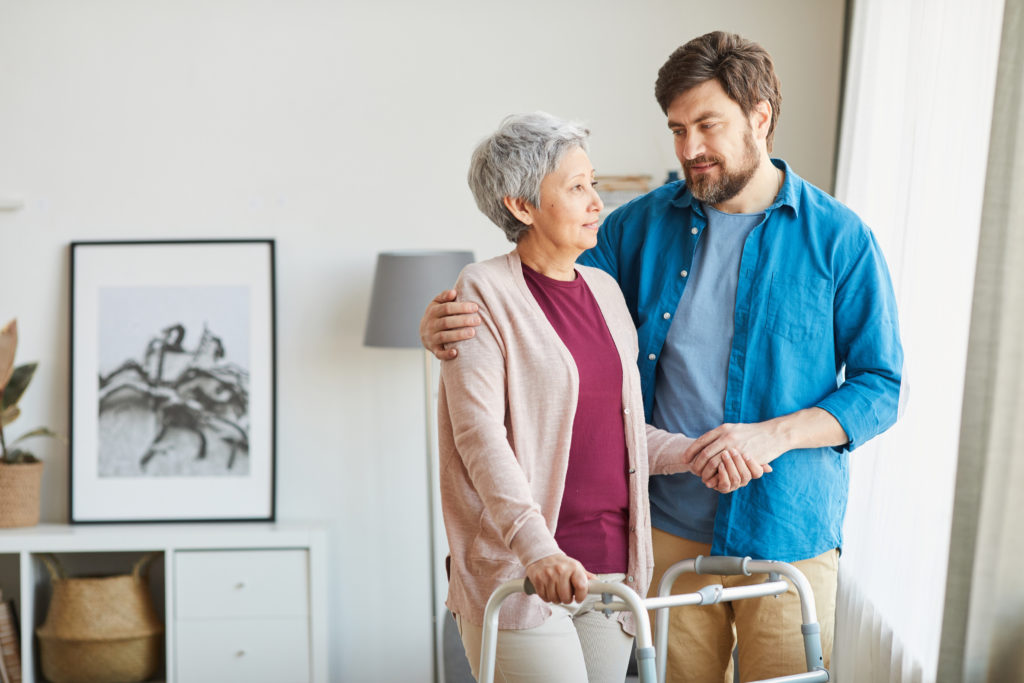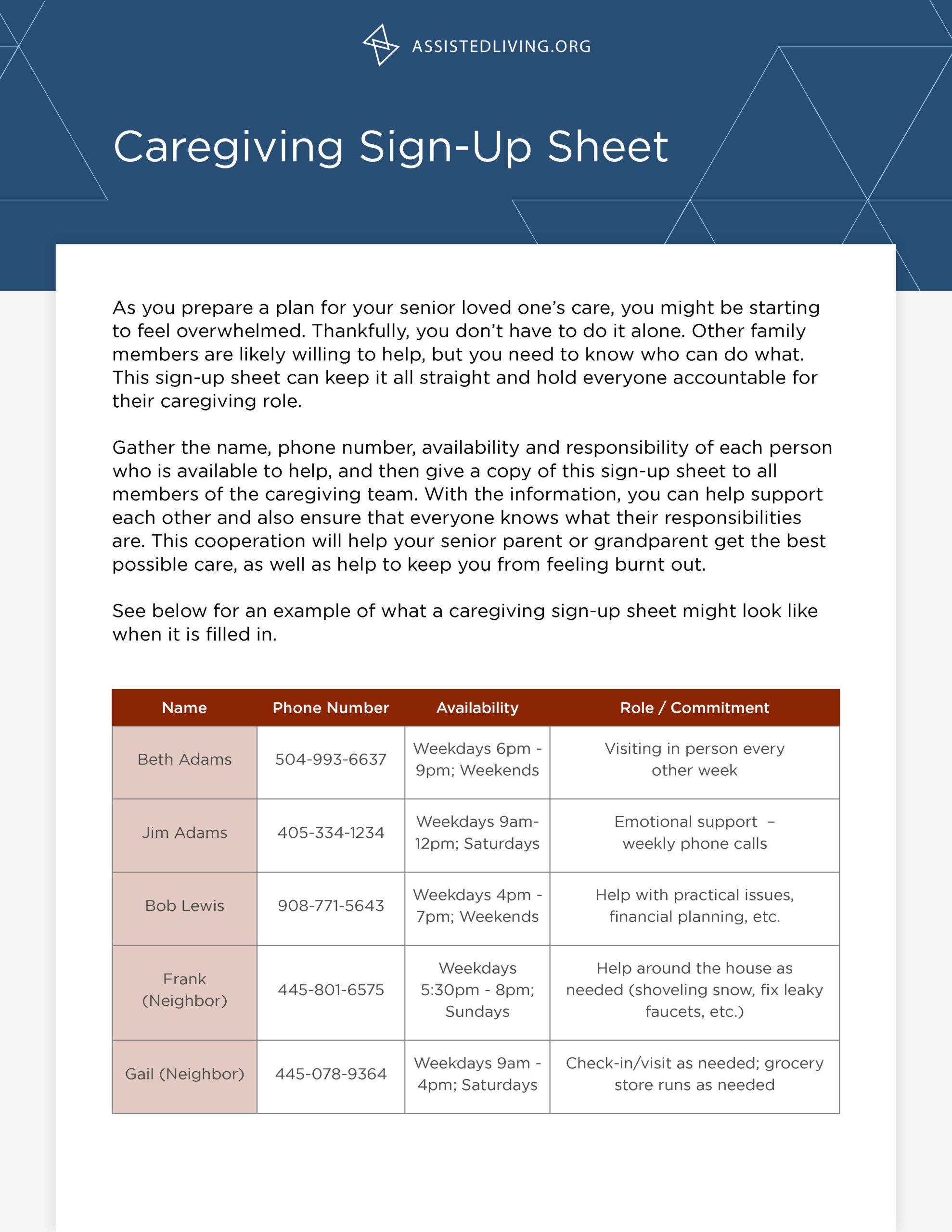Find Assisted Living in Your Area

Social isolation and loneliness have been concerns for seniors and their caregivers even before the events of recent years. For the millions of seniors who lack the ability or the opportunity to visit loved ones or friends, social isolation poses serious health concerns that their family members should know about, especially if they live far away.
There are many tools available for long-distance family members to keep in touch with their senior loved ones, including Zoom, FaceTime, and Skype. These tools can not only enable social calls but can also help family members coordinate home health services and plan virtual events to stave off the impact of social isolation.
In this guide, we provide an overview of how caregivers can enhance their loved one’s safety and well-being, even from a distance. This includes tips on how to stay connected with your loved ones, how to share caregiving duties, and how to make the most of your limited visits. We also provide a directory of state resources so that you can find the services you need to help your loved one age in place without feeling alone.

Long-Distance Caregiving: An Overview
The National Institute on Aging defines a long-distance caregiver as someone who lives an hour or more away from a person who needs care. Many children, siblings, cousins, and neighbors of seniors become long-distance caregivers without realizing the unique challenges the distance poses in addition to the challenges of caregiving from any distance.
Benefits of Long-Distance Caregiving
One of the main benefits of long-distance caregiving is that it can help older adults stay in their homes for as long as possible, allowing them to maintain their independence and reduce the amount of money they spend on assisted living or nursing home care. Yet despite the long distance, modern technology makes it possible for long-distance caregivers to continue offering emotional and financial support. Daily communication allows caregivers to stave off the effects of social isolation while checking on their loved one’s condition.
Long-distance caregiving also has several benefits for the caregiver. Even when they encounter challenges, many caregivers derive a sense of satisfaction from helping someone who cared for them in the past. Adult children, for example, may believe that they’re paying back their parents for all the love and support they’ve received over the years. Long-distance caregivers can also take pride in knowing that they’re helping a loved one get the best possible care. As a result, caregiving gives many people a sense of purpose.
Challenges of Long-Distance Caregiving
Long-distance caregiving has many benefits for caregivers and their loved ones, but the distance introduces some additional challenges. A caregiver who lives hundreds or even thousands of miles away may have difficulty finding and vetting local resources to help address their loved one’s physical, emotional, or financial needs. Long-distance caregivers may also feel guilty about not being able to visit their loved ones as often as they would like. If a caregiver isn’t able to visit for several months, they may not realize that their loved one isn’t eating enough or needs help with household chores.
Caregivers also incur significant costs when providing care from a distance. Some caregivers help their loved ones with everyday expenses, including rent, groceries, and utilities, leaving them with less money to spend on their own needs. Others make multiple visits per year, which may require the purchase of plane tickets or multiple tanks of gas to get back and forth. A caregiver may even lose some of their income if they have to take unpaid time off work to handle an emergency for a loved one.
If you don’t have anyone to help you with long-distance caregiving, it can also be difficult to know exactly what’s happening with your loved one at any given time. Unless you set up a video feed in their home, you may not know if they’re falling frequently, drinking enough water, eating nutritious meals, or receiving all the services you’ve coordinated from afar.
The Role of a Long-Distance Caregiver

Although long-distance caregiving can be challenging, there are plenty of things you can do from a distance to help an aging loved one stay healthy and happy. If you have several family members willing to provide care, you can also split up the caregiving duties, making your life a little less stressful.
What You Can Do From a Distance
Thanks to advances in technology, there are dozens of things you can do from a distance. Some of these activities involve paperwork and care coordination, while others are more focused on providing emotional support.
Here are just a few ideas for helping your older loved one from almost anywhere in the world:
- Coordinate services such as personal care, medication reminders, and home-delivered meals to help them stay healthy.
- Volunteer to review documents from your loved one’s insurance company, such as Medicare statements or letters regarding service approval or denial. A careful review of these documents can help you spot fraud or make sure they get all the benefits they’re entitled to receive.
- Be responsible for paying your loved one’s monthly bills, as well as any bills due quarterly or annually. This includes utility bills, property taxes, insurance premiums, rent or mortgage payments, streaming memberships, and debt payments.
- Help your loved one balance their checkbook or investigate unusual charges on their debit or credit cards.
- Hire someone to conduct a home safety audit for your loved one. This type of audit can uncover problems with wiring, HVAC systems, water heaters, kitchen appliances, and residential plumbing, giving you an opportunity to eliminate fire hazards and prevent injuries associated with unsafe living conditions.
- Create an emergency binder for your loved one. This should have a list of medications, a detailed overview of their medical history, and any other information first responders or hospital employees would need to make good care decisions.
- Educate yourself on your loved one’s health issues so that you can be an effective advocate when corresponding with health care professionals or speaking with them on the telephone.
- Give family members and friends regular updates on your loved one’s living situation.
- Provide video-based respite care if another caregiver needs time off to rest or take care of their personal needs.
- Schedule regular video chats with your loved one to prevent loneliness and isolation.
Roles and Responsibilities
Long-distance caregivers wear many hats, especially if they’re caring for older adults with chronic health conditions. As a caregiver, you may take on the following roles:
- Advocate: You may need to advocate for your loved one’s well-being when communicating with insurance companies, medical professionals, and representatives of community organizations that provide services to seniors.
- Financial advisor: Many seniors live on fixed incomes, making it difficult to pay for food, medical care, and other necessities. Your loved one may also have difficulty making mortgage payments or paying off other debts. You may need to serve as a financial adviser by reviewing their finances regularly and giving advice on how to make limited funds last as long as possible
- Legal representative: If you have power of attorney for your loved one, you may have to make medical or financial decisions on their behalf.
- Researcher: When you live far away from your loved one, you may need to hire professional caregivers or arrange for nonprofit organizations to deliver meals or provide medical transportation. If so, you’ll need to research the available options and determine which ones offer the best value.
- Employer: If your loved one needs paid assistance, you may have to take on the role of an employer, conducting telephone or video interviews, ordering background checks, and making sure each person gets paid the correct amount on time.
- Respite care provider: If you share caregiving duties with other family members, you may need to step in and provide respite care at some point. Respite care gives the primary caregiver a break to rest or take care of personal obligations, such as medical appointments and child care.
Share Responsibilities With Family Members
The caregiving team may include your loved one’s adult children, siblings, grandchildren, friends, fellow churchgoers, and neighbors. If several family members are involved in caregiving, it’s important to divvy up the duties carefully. You don’t want one person to become overwhelmed or resentful because they’re doing the majority of the work.
Assigning Duties
Before you assign duties, you need to come up with a list of responsibilities. It’s best to do this during a scheduled family meeting since waiting until after an emergency can prevent your loved one from getting the best possible care. Let family members know what you want to discuss so that everyone comes prepared to make decisions.
Since everyone’s medical and social needs differ, there’s no one-size-fits-all list of duties for family caregivers. A senior with limited mobility or signs of cognitive decline will need different care than an individual who is in better health. If you believe your loved one has trouble with their IADLs, or Instrumental Activities of Daily Living, you may need to assign a family caregiver to perform these duties:
- Paying bills
- Conducting in-person welfare checks
- Finding paid care providers to fill in the gaps when family members can’t be there to help
- Attending medical appointments with them
- Coordinating services provided by nonprofit organizations
- Organizing legal and medical documents
- Disputing inaccurate bank charges or medical bills
- Advocating their needs with doctors, nurses, social workers, and other professionals
- Making sure their prescriptions are refilled on time each month
- Ordering heating fuel, groceries, and other items to be delivered to their home
Once you have a list of duties in mind, appoint a primary caregiver who can respond quickly in the event of an emergency. The primary caregiver should live as close to your loved one as possible to make it easier to provide assistance. If they’re admitted to the hospital, for example, the primary caregiver should be someone who can visit regularly, speak with healthcare providers, and arrange for post-discharge care.
Consider Your Strengths and Weaknesses
During your family meeting, assign duties based on each person’s strengths, weaknesses, knowledge, and skills. If you’re good at negotiating or managing a budget, then you might be the best person to dispute fraudulent charges or pay your loved one’s bills. If you’re shy, you may not be the right person to ask questions during medical appointments.
If anyone in the family has unique expertise, such as in the medical or nursing field, use their skillset to your loved one’s advantage.
Set Limits
When you’re determining who will handle each duty, don’t be afraid to set limits. For example, someone who lives far away and can’t afford frequent trips can help in other ways, such as by Skyping their senior loved one regularly, organizing caregiver options, or paying their bills online.
Downloadable Caregiving “Roster”
Use the sheet below to keep track of who is available to help out with your caregiving duties.
Staying Connected With Aging Parents
The technology available today makes it much easier to stay connected with aging parents. Below, we listed some of the most helpful tools for long-distance caregivers.
Medical Alert Systems
Medical alert systems are no longer restrained to wearable phone dialers, though these can still be helpful. Modern alert systems have many advanced features, including:
- Immediate access to professional assistance: If the alert system has a help button, your loved one can connect with a response center in just a few seconds.
- GPS monitoring: For older adults with Alzheimer’s disease and other types of dementia, GPS monitoring is helpful in instances of wandering, when they may not remember where they are.
- Fall detection: In the United States, approximately 36 million falls occur among older adults each year. Falls can cause serious injuries, including concussions, hip fractures, and sprains. Some medical alert systems detect falls automatically and call for help in seconds.
- Cellular connectivity: If your loved one attends church services, visits with neighbors, or has frequent medical appointments, you may want to get a medical alert system that has cellular connectivity.
- Security measures: The most advanced systems detect smoke, high levels of carbon monoxide, and other potential hazards, protecting your loved one from serious harm.
- Health monitoring: Some systems include wearable devices capable of tracking a senior’s heart rate and other health-related metrics. These features are especially helpful for older adults with heart problems, diabetes, and other chronic illnesses. Advanced systems may even be able to send data directly to a healthcare provider for review.
Medical alert systems provide peace of mind, especially with modern health monitoring features. Yet, they can also provide a simple method of communicating with your loved one, making them invaluable tools in the long-distance caregiver’s arsenal.
Additional Communication and Monitoring Options
Medical alert systems are just one of the options available to help you stay connected with an aging parent and make sure they’re getting the care they need. Here are a few of the other helpful tools available.
| Tool | Features/Functions | Examples | Special Considerations |
| Video calling devices | Direct video connection with loved ones | – Facebook Portal
– Amazon Echo Show – GrandPad tablet for seniors |
– You may need to sign up for messaging software before using these devices.
– The screen needs to be bright enough for your loved one to see it in various lighting conditions. – Some seniors may struggle to see small screens. |
| Mobile apps | – Communication apps
– Medication reminders – Health trackers – Nutrition management |
– Facebook Mobile
– Pill Monitor – MedWatcher – PainScale – Fooducate |
– Communication apps send data directly to health care providers.
– Medication reminder apps can inform you if your loved one is following their doctor’s orders. – Nutrition management apps can help you identify a loved one’s dietary problems. – Health tracker apps can make it easier to monitor symptoms and determine if prescribed medications are working as intended. |
| Comm. Software | Communication via audio, video, and/or text | – Skype
– Zoom – Microsoft Teams |
– Your loved one will need a strong internet connection to support some communication services.
– If your loved one is hard of hearing, consider purchasing earbuds or over-the-ear headphones for audio and video communications. |
How To Maximize Each Visit With Your Loved One

If you can only visit your loved one a few times per year, you’ll want to maximize every visit to ensure you spend as much time together as possible. It’s also important to use each visit as an opportunity to make sure your loved one has everything they need to stay safe and healthy.
Here are some tips to help you get the most out of each visit:
- Take the opportunity to set up a medical alert system so you can monitor your loved one closely when you return home.
- Check the refrigerator, cabinets, and pantry to make sure your loved one appears to have enough nutritious food available to meet their needs.
- Get out of the house as much as possible. Trips to restaurants, botanical gardens, concert halls, and other destinations give you extra opportunities to make memories.
- Walk around the house and look for potential hazards, including poor lighting, damaged flooring, and cracked steps. If you notice any problems, take time to make repairs or hire a professional.
- Avoid bossing your loved one around or trying to control every aspect of the visit. You’ll both enjoy the visit much more if you can relax and focus on strengthening your relationship.
- Ask questions about your family’s history or suggest that you do an activity that reminds you of your childhood. This could include cooking, looking at a photo album, or just asking to hear a family story.
- Remember that you’re a visitor in your loved one’s home. Try to respect their wishes and leave things where you found them.
- If your loved one is housebound due to a chronic illness, plan to play board games, do a jigsaw puzzle, or engage in other indoor activities.
Tips for Long-Distance Caregivers
If you’re a first-time caregiver, it’s important to set yourself up for success. Follow these tips to make caregiving less stressful, both with your loved one and other caregivers:
- Have a family meeting as soon as possible to discuss your loved one’s needs.
- Ask the designated primary caregiver if they need any help. Even if you live far away, you can help with phone calls or paperwork, freeing up the primary caregiver for other activities.
- Get familiar with the senior resources available in your loved one’s city or county. Don’t wait until they need help.
- Schedule as many visits as possible to ensure the services you’ve coordinated are appropriate for your loved one’s needs and to notice any changes in their condition.
- Ask trusted friends for advice on balancing your caregiving duties with work, child care, and other obligations. If your friends have experience caring for aging parents, they can help you avoid common mistakes.
Understanding Your Loved One’s Needs
To be effective in your role as a long-distance caregiver, you need to understand your loved one’s medical needs. Before you start your official duties, ask the following questions to familiarize yourself with their health history:
- Have they had any surgical procedures? If so, what were they and why were they performed? Were there any complications?
- Do they take any prescription medications? If so, write down the name of each medication, the recommended dosage, the prescribing physician, and the reason your loved one takes the medication. You should also know the route of administration for each medication. Many medications are taken by mouth, but your loved one may need injections or other applications.
- Has your loved one been diagnosed with any chronic medical conditions? If so, what are they? What are the symptoms? How is each condition being managed?
- Does your loved one see any medical specialists, such as a gastroenterologist or cardiologist, on a regular basis?
- Has your loved one ever been diagnosed with a mental health condition? Has the condition gotten better or worse with age?
- Did your loved one’s parents or siblings have any chronic health conditions? If so, is there a possibility your loved one could develop the same problems?
- Has your loved one ever been told they have an increased risk of blood clots, dementia, heart attack, stroke, or another serious medical condition? If so, what steps can you take to minimize the risk?
- Is your loved one taking any over-the-counter medications, herbs, or supplements that could interfere with their prescriptions or cause one of their health conditions to worsen?
- Does your loved one have any physical limitations that could make it difficult for them to bathe, get dressed, prepare meals, or perform other activities? This may include joint pain or stiffness, balance problems, or a lack of coordination. Be sure to note whether your loved one uses a cane, walker, or other assistive device to get around.
State Resources for Long-Distance Caregivers
Each state has several resources to help seniors and their caregivers access information and services related to aging in place. The agencies listed below can refer you to local organizations that provide meal deliveries, medical transportation, and other services to help seniors stay active and maintain their independence. You can also contact one of these agencies if you need a referral for a medical alert system.
State Resources for Long-Distance Caregivers
Each state has several resources to help seniors and their caregivers access information and services related to aging in place. The agencies listed below can refer you to local organizations that provide meal deliveries, medical transportation, and other services to help seniors stay active and maintain their independence. You can also contact one of these agencies if you need a referral for a medical alert system.
| State | Contact |
| Alabama | (334) 242-5743 |
| Alaska | (907) 465-3250 |
| Arizona | (602) 542-4446 |
| Arkansas | (501) 686-9164 |
| California | (800) 510-2020 |
| Colorado | (720) 737-4909 |
| Connecticut | (860) 424-5055 |
| Delaware | (800) 223-9074 |
| Florida | (850) 414-2000 |
| Georgia | (404) 657-5258 |
| Hawaii | (808) 643-2372 |
| Idaho | (208) 334-3833 |
| Illinois | (800) 252-8966 |
| Indiana | (888) 673-0002 |
| Iowa | (866) 468-7887 |
| Kansas | (800) 842-0078 |
| Kentucky | (502) 564-6930 |
| Louisiana | (866) 758-5035 |
| Maine | (207) 287-9200 |
| Maryland | (410) 767-1100 |
| Massachusetts | (617) 727-7750 |
| Michigan | (517) 241-4100 |
| Minnesota | (651) 431-2500 |
| Mississippi | (601) 359-4915 |
| Missouri | (573) 751-4842 |
| Montana | (406) 444-4077 |
| Nebraska | (402) 471-2307 |
| Nevada | (888) 729-0571 |
| New Hampshire | (603) 271-9203 |
| New Jersey | (877) 222-3737 |
| New Mexico | (505) 476-4799 |
| New York | (844) 697-6321 |
| North Carolina | (919) 855-3400 |
| North Dakota | (855) 462-5465 |
| Ohio | (800) 266-4346 |
| Oklahoma | (405) 521-2281 |
| Oregon | (503) 945-5600 |
| Pennsylvania | (717) 783-1550 |
| Rhode Island | (401) 462-3000 |
| South Carolina | (800) 868-9095 |
| South Dakota | (605) 773-3656 |
| Tennessee | (615) 741-2056 |
| Texas | (855) 937-2372 |
| Utah | (801) 538-3910 |
| Vermont | (800) 642-5119 |
| Virginia | (804) 662-9333 |
| Washington | (360) 725-2300 |
| West Virginia | (304) 558-3317 |
| Wisconsin | (608) 266-2536 |
| Wyoming | (307) 777-7995 |

